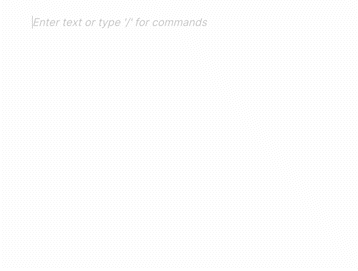Real-time Collaboration (multiplayer text editor)
Let's see how you can add Multiplayer capabilities to your BlockNote setup, and allow real-time collaboration between users (similar to Google Docs):

Try the live demo on the homepage (opens in a new tab)
BlockNote uses Yjs (opens in a new tab) for this, and you can set it up with the collaboration option:
import * as Y from "yjs";
import { WebrtcProvider } from "y-webrtc";
// ...
const doc = new Y.Doc();
const provider = new WebrtcProvider("my-document-id", doc); // setup a yjs provider (explained below)
const editor = useCreateBlockNote({
// ...
collaboration: {
// The Yjs Provider responsible for transporting updates:
provider,
// Where to store BlockNote data in the Y.Doc:
fragment: doc.getXmlFragment("document-store"),
// Information (name and color) for this user:
user: {
name: "My Username",
color: "#ff0000",
},
},
// ...
});Yjs Providers
When a user edits the document, an incremental change (or "update") is captured and can be shared between users of your app. You can share these updates by setting up a Yjs Provider. In the snipped above, we use y-webrtc (opens in a new tab) which shares updates over WebRTC (and BroadcastChannel), but you might be interested in different providers for production-ready use cases.
- Liveblocks (opens in a new tab) A fully hosted WebSocket infrastructure and persisted data store for Yjs documents. Includes webhooks, REST API, and browser DevTools, all for Yjs
- PartyKit (opens in a new tab) A serverless provider that runs on Cloudflare
- Hocuspocus (opens in a new tab) open source and extensible Node.js server with pluggable storage (scales with Redis)
- y-websocket (opens in a new tab) provider that you can connect to your own websocket server
- y-indexeddb (opens in a new tab) for offline storage
- y-webrtc (opens in a new tab) transmits updates over WebRTC
- Matrix-CRDT (opens in a new tab) syncs updates over Matrix (experimental)
- Nostr-CRDT (opens in a new tab) syncs updates over Nostr (experimental)
Liveblocks
Liveblocks provides a hosted back-end for Yjs which allows you to download and set up a real-time multiplayer BlockNote example with one command.
npx create-liveblocks-app@latest --example nextjs-yjs-blocknote-advancedYou can also try the same example in a live demo (opens in a new tab). To start with Liveblocks and BlockNote make sure to follow their getting started guide (opens in a new tab).
Partykit
For development purposes, you can use our Partykit server to test collaborative features. Replace the WebrtcProvider provider in the example below with a YPartyKitProvider:
// npm install y-partykit
import YPartyKitProvider from "y-partykit/provider";
const provider = new YPartyKitProvider(
"blocknote-dev.yousefed.partykit.dev",
// use a unique name as a "room" for your application:
"your-project-name",
doc,
);To learn how to set up your own development / production servers, check out the PartyKit docs (opens in a new tab) and the BlockNote + Partykit example (opens in a new tab).